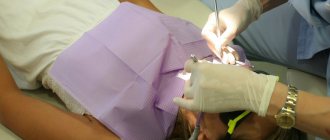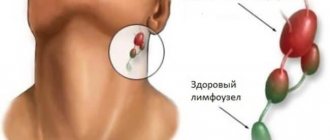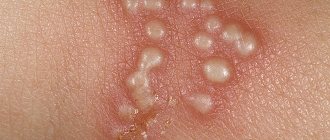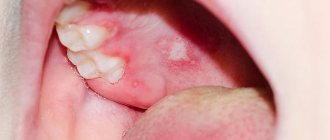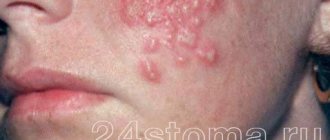Many people are familiar with the unpleasant manifestations of herpes. This is not surprising, because according to WHO, more than 78% of the world's population is infected with the most common types of the virus: 67% are infected with herpes simplex virus type 1, and another 11% with herpes simplex virus type 2.
What is herpes, what causes it, why is it dangerous, and how should it be treated? Having knowledge about the disease, you can minimize the risk of its exacerbation, and most importantly, avoid complications.
Herpes on the lips
Herpes is a virus
The source of the disease is the so-called herpes viruses. These are DNA-containing microorganisms that are causative agents of various types of infections.
The initial entry of the virus into the body usually occurs through the mucous membranes (although entry through damaged skin is not excluded). Having overcome tissue barriers, harmful microorganisms enter the blood and lymph and spread throughout the body. They are able to penetrate the cells of internal organs and nerve endings. The peculiarity and danger of herpes is that it is genetically introduced into the nucleus of nerve cells, after which it remains in the body forever.
Many people do not even realize that they are carriers of the virus, since the pathology in most cases is asymptomatic, not showing itself in any way (this is called a latent state).
The human immune system is capable of suppressing the development of the virus, but if it is weakened, the infection “awakens.”
Herpes Virus
Causes
There are many provoking factors leading to exacerbation of the disease. In addition to the weakening of immune forces, there are a number of other reasons:
- Emotional stress, physical fatigue, stressful situations.
- Long-term insolation.
- Surgical interventions.
- Taking immunosuppressive drugs.
- Hormonal imbalances.
In addition, there may be a combination of several negative factors leading to the activation of infection in the body. During illness, it is important to isolate yourself from others.
Symptoms of different types of herpes
A “sleeping” virus may not bother its host for years. But if for some reason the virus enters the active phase, it is easy to recognize - by its characteristic rashes. The “classic” visual sign of herpes is itchy, watery blisters that can appear in different places - on the face and on the body.
There are several types of herpes virus - they differ in their manifestations. Most often in medical practice, diagnoses such as HSV-1 and HSV-2 are encountered - this is the abbreviated name for herpes simplex viruses types 1 and 2.
Cold sores and chicken pox are related diseases caused by herpes. Several types of the virus can “coexist” in one person.
| Many people call this pathology a “cold on the lips,” although the “classic” cold and herpes are different things. We are talking about the herpes simplex virus type 1, which usually “attacks” the lips and nasolabial triangle. Externally, the disease manifests itself in the form of rashes. They represent one or a whole cluster of bubbles with liquid contents. When asked whether there can be a fever with herpes, the answer is positive: many patients complain of fever, headaches and general weakness. Among doctors, there is another name for pathology: when you see a diagnosis such as oral or labial herpes in your medical record, know that we are talking about the herpes simplex virus type 1. Herpes on the lip is usually very itchy |
| The second type of herpes simplex is accompanied by the development of genital (genital) infections. The disease in most cases is asymptomatic or, as with labial herpes, is accompanied by the appearance of blisters (ulcers), but only in the area of the external genitalia. Other signs of HSV-2 are fever, body aches, fatigue, and swollen lymph nodes in the genitals. Most often, the disease is transmitted sexually, but infection can also occur from a person with labial herpes. |
| Virus type 3, also known as the herpes zoster virus, is the culprit of chickenpox. To become infected, it is enough to enter into a conversation with a sick person (transmission occurs through airborne droplets). Having had chickenpox, a person remains a carrier of this virus for the rest of his life. In case of relapse, there is a risk of developing herpes zoster. This disease is characterized by the appearance of itchy rashes throughout the body, as well as fever. Chicken pox |
| Herpes type 4 causes such a serious infectious disease as mononucleosis. This disease is accompanied by enlarged lymph nodes and fever; the patient complains of a sore throat and general weakness. The liver and spleen are also affected. |
| Herpes type 5 provokes the development of cytomegalovirus. The disease manifests itself differently, depending on which organ is affected. A runny nose, disturbances in the gastrointestinal tract, inflammatory diseases of the genital organs - all this can be a sign of pathology. |
| In addition to those described above, there are also types 6, 7 and 8 herpes. Scientists are now studying these viruses. |
Herpes - what causes it?
The risk of contracting an infection arises from a very early age, because there are a huge number of adults around a small child, most of whom are carriers of herpes. Infection can also occur in the womb of an infected mother.
So, what can cause herpes on the lips? Children (and adults) often become infected through kissing, as well as through sharing utensils. If you are near a person with herpes who coughs or sneezes, there is a high risk of infection through airborne droplets. In addition, the virus is transmitted sexually (primarily this concerns HSV-2). People who receive blood transfusions are also at risk.
Fortunately, most people infected with the herpes virus (about 80%) have an inactive form of the infection. However, there are factors that provoke a relapse - then the “sleeping” virus begins to actively multiply. So, some people regularly suffer from sores on their lips - the hated “cold” can appear 5-10 times a year. The cause of recurrence of the disease may be:
- diseases – endocrine, viral and bacterial;
- hypothermia;
- stress;
- exhaustion of the body;
- overwork;
- injuries;
- metabolic disorders.
In women, another provoking factor is menstruation.
Reminder in case of illness
It must be remembered that when a rash appears, a person becomes acutely contagious. Moreover, not only those around him can suffer, but also the sick person himself. For example, from a lesion on the lips with dirty hands, the herpes virus can be carried into the eyes or genitals.
Therefore, it is important to follow the following rules
- Do not touch lips affected by rashes. If you touch them, wash your hands thoroughly.
- Use your own towel and utensils.
- If your lips are affected, do not squeeze the blisters or pick off the scabs. This may cause additional skin infection.
- Refrain from kissing and oral-genital contact.
- If you wear contact lenses, do not wet them with saliva to moisten them.
- Apply antiviral cream to your lips not with your fingers, but with cosmetic sticks.
Is there any prevention against herpes?
To resist the virus, you need a strong immune system. Therefore, those who suffer from frequent colds on the lips need to pay attention to their immune system. Take care of a healthy, balanced diet, do not forget about sports, maintain a normal daily schedule (first of all, ensure that you get adequate sleep) and try to get rid of bad habits (smoking, etc.).
It is important to practice basic hygiene, including regular hand washing. It is recommended to use personal hygiene products. During infectious epidemics, it is advisable to avoid staying in crowded places if possible.
To reduce the risk of genital herpes, you should use condoms.
Precautionary measures
In order for the disease to pass in a mild form and its complications to appear, the following recommendations should be followed:
- Rule #1. Avoid touching your face with your hands, especially in the area of blisters. Otherwise, you risk spreading the infection to a larger area of skin.
- Rule #2. During illness, be especially careful about your personal hygiene.
- Rule #3. Isolate yourself and try to avoid close contact with people, especially the elderly and children.
How to find out if there is a virus?
Already during the initial examination of the patient, the doctor can determine the presence of herpes (often people who have visual manifestations of the disease seek medical help). But in order to confirm the diagnosis and determine the degree of development of the infection, laboratory tests are prescribed.
Tests are important when planning pregnancy, since the virus is dangerous to the fetus. Tests are also required for patients preparing for transplantation.
There are several diagnostic methods - which one will be optimal in a particular case, the doctor will tell you. The presence of the herpes virus and its type can be determined by blood tests (enzyme immunoassay, PCR analysis, immunofluorescence reaction) and scrapings (culture method, immunofluorescence reaction). The most accurate, but also the most time-consuming and expensive method is the cultural method, which involves “growing” a virus obtained from a patient’s biomaterial in laboratory conditions.
Diagnosis of herpes
How does herpes simplex develop?
- It all starts with itching and/or tingling in the place where herpes develops - as we have already found out, most often this is the area of the nasolabial triangle. The skin turns red and begins to itch.
- Next, the stage of inflammation begins. Swelling appears in the affected area and a small, painful pimple appears - a blister containing clear liquid. Over time, this liquid becomes cloudy. A small pimple(s) gradually increases in size.
- The blisters burst 3–5 days after the onset of the disease. A liquid flows from them, containing an uncountable number of viral particles. During this period, contact with a sick person should be stopped, since the risk of infection is very high. At the site of the rash, ulcers with a purulent crust (scabs) form. When the scab is damaged, bleeding begins.
A natural question for every patient is, how many days does it take for herpes to go away? This usually takes about 10 days. If symptoms do not disappear during this time, you should see a doctor, since herpes can signal the presence of other diseases.
Herpes ointment
Possible complications
The herpes virus should not be perceived as an unpleasant but harmless “sore.” This is a rather insidious disease that poses a particular danger to pregnant women, infants and people with weakened immune systems (patients with cancer, people with HIV and AIDS).
The virus is not limited to superficial tissues - it easily penetrates into internal ones. The main targets of herpes are the mucous membranes, skin, eyes (conjunctivitis can also be a consequence of herpes), as well as the central nervous system and brain. Lymph nodes and internal organs can be affected by the virus. Due to the fault of the pathogenic microorganism, the functioning of the liver, lungs, intestines and kidneys can be disrupted.
The consequences of herpes can be stomatitis, infertility, miscarriage, congenital deformities in children, encephalitis, inflammation in the joints, prostatitis, benign and malignant tumors. Scientists, based on research, associate the development of multiple sclerosis and Alzheimer's disease with herpes.
If a person’s immune system is weakened, other infections, both viral and bacterial, can “join” herpes, and this, in turn, puts an increased burden on the heart.
So, is herpes a completely harmless disease? Are there those for whom it is dangerous?
In most cases, harmless. But there are rare circumstances when herpes can harm your health.
Pregnancy and childbirth
If a woman becomes infected with herpes for the first time and this happens in the last 6 weeks of pregnancy, then there is a high risk of transmitting this virus to the child during natural childbirth. If the expectant mother has had herpes before, the risk is reduced. After birth, a child can be infected both during breastfeeding and through kissing.
Herpes in babies is called neonatal, and it is more severe than in adults. The baby's immune system is too weak to adequately respond to the virus with an attack. Therefore, he quickly falls ill, and the symptoms in children are worse than in adults. In addition to the rash, you may experience fever, lethargy, lack of appetite, rashes and blisters all over your face and body. In the worst-case scenario, the child becomes worse and an ambulance needs to be called. Neonatal herpes is rare: 0.1% of newborns per year, according to US statistics.
Remember: if you know you have the herpes virus, do not kiss newborn babies or touch their face.
Presence of HIV infection
People with herpes are at higher risk of contracting HIV than those without. Especially if they have genital herpes. In cases where a person is sick with both genital herpes and HIV infection, both diseases are more severe. Therefore, it is necessary to get tested regularly for HIV and practice safe sex to stay healthy.
Which doctor's help might be needed for herpes?
With the questions “what causes herpes to constantly appear on the lips” and “I’m tormented by herpes - what to do?” You can contact your therapist first. He will subsequently refer you to an infectious disease specialist or dermatologist (if we are talking about an oral virus). Patients with a genital infection should see a gynecologist (women) or a urologist (men). Since the pathology may be associated with diseases of the internal organs, you may need to consult a gastroenterologist, hepatologist or pulmonologist.
How to treat herpes?
It is impossible to completely destroy a virus that has entered the body. But it is quite possible to suppress its activity so much that it does not bother you. In modern medicine, an integrated approach is used for this. The best results are obtained by combination therapy, which involves the use of antiviral drugs (they are available in the form of drugs for internal use and in the form of external agents), as well as drugs that strengthen the immune system. In some cases, the patient is additionally prescribed local analgesics and physiotherapeutic procedures.
Many people are interested in whether it is possible to burn herpes with alcohol? Alas, this method does not affect the virus, but only damages the mucous membranes, so it is better to use special ointments.
What remedies are usually prescribed for herpes on the lips? The table shows a list of the most common medications used to treat the virus.
| Name, dosage form | Description |
| Acyclovir (aka Zovirax). Available in the form of tablets, cream, eye ointments, injection solutions. | An inexpensive antiviral drug that stops the replication of the virus. Addressed to adults and children over 3 years old. Not recommended for use during pregnancy. Antiviral ointment |
| Valacyclovir (aka Valtrex) Available in the form of 500 mg tablets. | One of the best drugs for herpes. It differs from Acyclovir in the method of delivery of the active ingredient. Suppresses the activity of the virus and reduces symptoms. When taking the drug, the risk of infection through contact with other people is reduced. Treatment of herpes in 3 days |
| Famciclovir (aka Famvir) Available in the form of tablets 125, 250 and 500 mg. | Just like Acyclovir and Valtrex, it blocks the replication of the virus. Helps in the treatment of simple virus and the virus that causes chickenpox. Famciclovir is effective against viruses resistant to Acyclovir. Famciclovir |
| Panavir Available in the form of a solution for intravenous injection, as well as in the form of a gel and suppositories (suppositories). | Antiviral, anti-inflammatory and immunomodulatory drug of plant origin. Increases the body's resistance to infections and has an antipyretic effect. |
| Docosanol (aka Erazaban) Available in the form of a cream for external use. | Has an antiviral effect. Intended for use in adults and children over 12 years of age. Pregnant women are prescribed with caution. |
| Proteflazid Available in the form of drops. | Antiviral agent for systemic use. Intended for the treatment of herpes simplex in children and adults. Used in pediatric practice (including in children under 1 year). |
| Flavoside Available in the form of syrup. | Effective in the treatment of herpes simplex, as well as in the treatment and prevention of influenza. Used in pediatric practice (including in children under 1 year). |
The presented list of drugs is far from complete - the doctor, depending on the characteristics of a particular patient, may recommend other drugs. For example, in some cases antibiotics cannot be avoided (if there is a risk of contracting other infections).
Prevention and treatment of the disease
A herpetic infection can resolve on its own without treatment, but in this case the recovery period will be longer and range from 1 to 3 weeks. If you start taking medications on time, the disease will go away faster and easier. Treatment should begin when the first symptoms appear - burning and tingling, in places typical for the virus.
Also, do not forget about preventive measures. Try to plan your day correctly, get enough sleep, and avoid stressful situations. On sunny days, use protective creams, and in the cold season, moisturizing hygienic lipsticks.
The following groups of drugs are used to treat herpes:
- Antiviral agents in the form of ointments and tablets. The most commonly used are Acyclovir, Penciclovir, and Valaciclovir. When using them, the duration of the disease can be reduced to three days.
- Painkillers and antipyretics. They are used to relieve unpleasant symptoms: high fever, itching and burning. If such manifestations occur, you can take paracetamol or any NSAID (Nise, Nimesil, Ibuprofen).
- Folk remedies also help combat discomfort during illness. Gel with aloe vera extract, witch hazel and lemon balm have proven themselves to be effective in treating infections.





